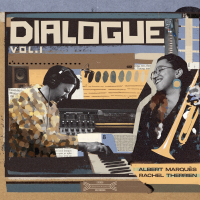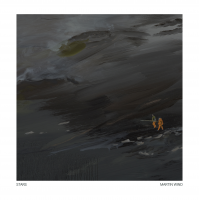Home » Jazz Articles » Multiple Reviews » From An Island: Ches Smith & We All Break and Dominican ...
From An Island: Ches Smith & We All Break and Dominican Jazz Project
Musically there is a lot of common ground, but both countries have distinct styles as well. Rites in Haiti's Vodou religion are accompanied by a drumming and chanting style heavily based in West African traditions, while the Dominican Republic is the home of merengue (one of the most influential Latin styles) as well as other Cuban-influenced music. Both of these albums include vocals, with the languages reflecting their history: Kreyòl ayisyen, the French-based Haitian Creole that is the native language of most Haitians (along with French it is also one of the official languages); and Spanish, the official language of the Dominican Republic. These two 2021 albums vividly present those contrasts, as well as representing a high level of achievement in the music of both places.
 Ches Smith & We All Break
Ches Smith & We All Break Path of Seven Colors
Pyroclastic Records
2021
Drummer/composer Ches Smith found his way into Haitian Vodou drumming almost by accident. Asked to accompany a Haitian dance class, he was quickly instructed in the basics. He says "my attraction to the music of Haitian Vodou was instant and strong." As he worked with the rhythms, he found that they had all of the characteristics he looked for in all of the various musics he plays, among them polyrhythm, polytonality, improvisation, and most vitally surprise. As an outsider to the Haitian culture, for years Smith kept his fascination with the music secret, fearing the appearance of appropriation.
Two of the compositions ("Women of Iron" and the title tune) are purely instrumental. The rest combine songs (both traditional and newly written by Daniel Brevil) with Smith's compositions into a true fusion of jazz and ritual. "Woule Pou Mwen" opens the set with a brief secular Kongo rhythm, but "Here's The Light" introduces the jazz element, led by Puerto Rican saxophonist Miguel Zenon and pianist Matt Mitchell (who Smith says has a mode of playing nearly designed for Haitian Vodou, and reappears here after playing on We All Break's 2015 debut).
"Lord of Healing" (the longest track on the album) is an especially good example of the fusion process. The four sections each utilize a different Petwo rhythm (from rites calling on the Petwo spirits) and incorporate two traditional songs. A rubato song begins, joined by tanbou drums which speed up to signal the first instrumental section. The drums continue to accompany dramatic, jagged unison lines from all of the other instruments. Piano and saxophone almost become drums themselves, playing a repeated riff to the dramatic conclusion, calling to mind Western minimalism like the music of Philip Glass and Steve Reich as well as ritual trance. It is a study in tension buildup and release, one surprise following another.
Path of Seven Colors is a rare example of successful cultural fusion. Jazz composition and improvisation and Haitian Vodou music both retain their identities, while simultaneously enriching each other and forming a harmonious whole.
 Dominican Jazz Project
Dominican Jazz Project Desde Lejos
Summit Records
2021
Since the Dominican Jazz Project's debut album The Dominican Jazz Project (Summit Records, 2016) the band has been very productive, performing at festivals and jazz clubs and giving masterclasses at universities in the United States and the Dominican Republic. 2020 was to be the year when they would return to the recording studio, but of course the COVID-19 pandemic made in-person recording nearly impossible. Not wanting to delay their plans, they opted to record remotely instead— hence the album's title "Desde Lejos" (From Afar).
Pianist Stephen Anderson again contributes the lion's share of the compositions, and his "Fuera de la Oscuridad" opens the album with a rush of fast tempo Latin jazz music. The composer's piano solo is a highlight, along with solos by saxophonist Sandy Gabriel and drummer Guy Frometa. Guitarist/composer/vocalist Carlos Luis also makes a return appearance, contributing his guitar and voice to the ballads "Como un Rayo Ciego" and "Una Más." Both tracks also feature Guillo Carias on clavietta, a melodica-like reed instrument (his contributions were recorded in North Carolina, while Anderson remained outside to protect this icon of Dominican jazz who is now in his 80s). Carlas is also represented as both composer and lead voice on "Si Tu Supieras" (balanced by trumpeter Mayquel Gonzalez).
The band suffered a huge loss with the passing of bassist Jeffry Eckels , who had been significantly involved in the project from the start. The album includes his composition "Siempre Adelante," which had been planned before his death (featuring Gabriel's soprano saxophone, along with electric piano and trumpet), as well as Anderson's homage "Sin Palabras" (with Andrson on both accordion and piano) . Despite all of the challenges, the album is a worthy successor to the debut album—as well as a reminder of the power of music and brotherhood.
Tracks and Personnel
Path of Seven ColorsTracks: Woule Pou Mwen; Here's The Light; Leaves Arrive; Women of Iron; Lord of Healing; Raw Urbane; Path of Seven Colors; The Vulgar Cycle.
Personnel: Ches Smith: drums; Matt Mitchell: piano; Miguel Zenon: saxophone, alto; Daniel Brevil: percussion; Markus Schwartz: percussion; Nick Dunston: bass; Sirene Dantor Rene: voice / vocals; Fanfan Jean-Guy Rene: percussion.
Desde Lejos
Tracks: Fuera de la Oscuridad; Ritmos de Baní; Sin Palabras; Como un Rayo Ciego; Si Tu Supieras; Pero Aún no es el Fin; Siempre Adelante; Una Más; Un Cambio de Ritmo.
Personnel: Sandy Gabriel: saxophones; Rahsaan Barber: tenor saxophone (2); Mayquel González: trumpet (5,6,7); Guillo Carias: clavietta (4,5,8); Carlos Luis: guitar, voice (4,8); Stephen Anderson: piano, accordion (3); Ramón Vázquez, bass; Guy Frómeta: drums; David Almengod: percussion, voice; Craig Butterfield: bass (1, 3); Jason Foureman: bass (4); Juan Álamo: percussion (3,6); Marc Callahan: coro (2).
Tags
Multiple Reviews
Ches Smith
Mark Sullivan
Dr. Jazz Operations
Pyroclastic Records
Daniel Brevil
Miguel Zenon
Matt Mitchell
Philip Glass
Steve Reich
Summit Records
Dominican Jazz Project
Stephen Anderson
Sandy Gabriel
Guy Frometa
Carlos Luis
Guillo Carias
Mayquel Gonzàlez
Jeffry Eckels
Path of Seven Colors
Desde Lejos
PREVIOUS / NEXT
Ches Smith Concerts
Support All About Jazz
 All About Jazz has been a pillar of jazz since 1995, championing it as an art form and, more importantly, supporting the musicians who make it. Our enduring commitment has made "AAJ" one of the most culturally important websites of its kind, read by hundreds of thousands of fans, musicians and industry figures every month.
All About Jazz has been a pillar of jazz since 1995, championing it as an art form and, more importantly, supporting the musicians who make it. Our enduring commitment has made "AAJ" one of the most culturally important websites of its kind, read by hundreds of thousands of fans, musicians and industry figures every month.























